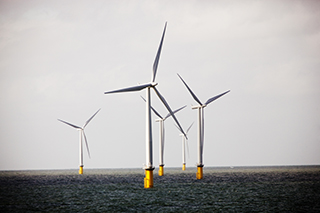(Bloomberg) — Big oil is dipping a few more toes into clean energy.
Exxon Mobil Corp. is partnering with a company to capture carbon-dioxide emissions from power plants. Total SA, the French oil supermajor, announced a $1.1 billion deal Monday to buy the battery maker Saft Groupe SA, complementing its 2011 purchase of a majority stake in the solar-panel maker SunPower Corp. And the Canadian pipeline company Enbridge Inc. announced Tuesday it will pay $218 million for stakes in offshore wind farms as it attempts to double its low-carbon generating capacity.
While fossil fuel companies have been dabbling in clean energy for years, they typically stayed close to their roots by focusing on ethanol and other biofuels. This round of investments takes them into the heart of the clean energy industry. As crude prices struggle to recover and growth projections for renewables soar, oil companies see a chance to diversify.
“The supermajors recognize there is going to be tremendous growth in low-carbon sources of energy,” said Jason Bordoff, director of the Center on Global Energy Policy at Columbia University. “To thrive in the long term, they need a mix in their portfolio.”
Petroleum giants began investing in clean energy as early as the 1970s, when the oil crisis prompted Exxon to explore solar’s potential. Eventually oil companies settled on a renewable resource more in line with their traditional business: biofuels. Between 2005 and 2013, oil majors invested more than $9.4 billion on ethanol and other plant-based fuels, according to Bloomberg New Energy Finance.
Now as wind, solar and other forms of clean energy become more viable, they are drawing more notice from once-leery investors. Renewables were the biggest source of new power added to U.S. electrical grids last year, outpacing coal and gas-fired plants. Global solar capacity is projected to double by the end of 2018, and wind power will increase by 50%.
Oil companies aren’t the only traditional energy players pushing into clean power. On Tuesday, Engie SA, the French energy giant formerly known as GDF Suez SA, said it was buying an 80% stake in Green Charge Networks, a Santa Clara, California, storage company.
“This stuff has gone so mainstream that it seems inevitable some of the largest energy companies in the world will find their way into it,” said Ethan Zindler, a Bloomberg New Energy Finance analyst.
Comparatively Small
Still, the investments are tiny by petroleum industry standards. Even Total’s $1.1 billion deal to buy Saft — a record for the storage industry — represents a tiny fraction of the oil giant’s $120 billion market value.
Exxon hasn’t disclosed the value of its investment in a partnership with FuelCell Energy Inc. of Danbury, Connecticut, announced last week, to reduce the cost of cutting emissions from new and existing fossil fuel plants. Enbridge’s $218 million deal Tuesday to buy stakes in three farms located off France’s coast from Dong Energy A/S equals less than 1% of the pipeline company’s 2015 revenue.
Timothy Fox, an analyst at ClearView Energy Partners LLC, said it’s too early to tell whether the investments represent a broader push by oil companies at large to diversify their clean energy holdings.
“Diversification efforts in the past may have been in response to resource scarcity,” Fox said in an e-mail. In a period of “resource adequacy,” the goal may be more about “maintaining a dominant role in the energy markets.”




